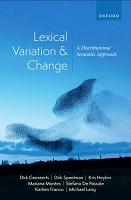Lexical Variation and Change
A Distributional Semantic Approach
Author(s)
Geeraerts, Dirk
Speelman, Dirk
Heylen, Kris
Montes, Mariana
De Pascale, Stefano
Franco, Karlien
Lang, Michael
Language
EnglishAbstract
Distributional semantics embodies the idea that the context in which a word occurs reveals the meaning of that word. In contemporary corpus linguistics, that idea takes shape in various types of quantitative context analysis. This monograph explores how count-based token-level semantic vector spaces, as an advanced form of such a quantitative methodology, can be applied to the study of polysemy, lexical variation, and lectometry. What can distributional models reveal about meaning? How can they be used to analyse the semantic relationship between near-synonyms? And how can they contribute to the study of lexical variation as a sociolinguistic variable? The book details the conceptual background of lexical semantic and lexical variation research, explains the mechanism of distributional modelling, and introduces distributional workflows and corpus linguistic tools to answer the questions. Combining a cognitive linguistic interest in meaning with a sociolinguistic interest in variation, it illustrates that distributional methodology with case studies on Dutch and Spanish lexical data, focusing on the value of distributional models for semantic analysis, the interaction of semasiological and onomasiological change, and sociolinguistic issues of lexical standardization and pluricentricity.


 Download
Download Web Shop
Web Shop